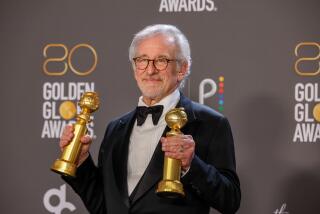Europe Focusing on Public TV
- Share via
CANNES, France — In the U.S., it would be unthinkable to see PBS pay up for the right to air the Super Bowl or that the publicly funded network would outbid NBC for the Olympics.
But in Europe, state-run public TV channels not only have historically broadcast the Olympics, but also the wildly popular World Cup soccer tournament and a steady stream of blockbuster Hollywood movies. And they’ve spent heavily on this costly programming.
The day of reckoning may be near, however. Europe’s public TV sector has run up huge budget deficits in recent years, prompting private broadcasters--their rivals--to cry foul. European countries now are considering cutting back support for public TV.
The plight and role of Europe’s battered public TV sector will be a hot topic as 11,600 TV executives meet in Cannes, France, for the MIPCOM International TV program market that began Monday, and goes through Friday.
Hollywood is keenly interested in this provincial brawl. If public TV is downsized and state aid is reduced, more market power will likely flow to private TV, which is Hollywood’s biggest TV customer in Europe. But if public TV maintains its status quo, the development of private TV in Europe will slow.
The launch of specialized satellite/cable channels by Europe’s public broadcasting sector--such as the British Broadcasting Corp.’s decision to give away its 24-hour news channel free to cable and satellite outlets--directly affects U.S. companies. The BBC doesn’t just have the news channel. It’s also starting a children’s channel. That channel will compete with the Disney Channel, Nickelodeon and Fox Kids for cable and satellite TV carriage.
“We’re fine with the competition, but as long as it’s a level playing field,” says David Hulbert, London-based president of Walt Disney Television International Europe.
The big news is that the Italian government in early September floated the idea of privatizing two of the country’s three public TV networks, considered a radical downsizing. The European Broadcasting Union, a group of mostly public TV networks, has called the resulting frenzy a “national media war” in Italy.
Public TV advocates say government-run channels are cultural treasures that provide an alternative to private sector TV.
Opponents counter that public channels have an unfair advantage. They typically are funded by both a special TV tax as well as on-air advertising, which they can sell at rates far lower than private TV ad rates.
“If you’re receiving public money, you should offer programs to justify the funding,” says Ross Biggam, general director of the Assn. of Commercial Television of Europe, a Brussels-based trade group of Europe’s big private broadcasters. ACT wants state broadcasters to confine themselves to public service programming.
Europe’s private broadcasters filed 10 unfair competition complaints against their public TV rivals in Western European countries since 1992. Those complaints typically are rejected or sit in limbo at the European Commission, the executive branch of the European Union, a governmental body of 15 Western European countries.
In May, however, a European court ruled that the EC was in error when it rejected an unfair complaint brought by a private broadcaster in Portugal against the state broadcaster, signaling a changing environment for public TV.
Favorable treatment for tax-funded broadcasters also is driven by a heavy dose of politics, since governments oversee public broadcasters. Unlike the U.S., public broadcasters tend to have the dominant news operations, influential molders of public opinion that give the public broadcasters clout with politicians.
“My personal sympathies are strongly in favor of public TV,” says Ireland-born Bill Grantham, who is an unlikely public TV defender considering he now works as a Los Angeles-based entertainment attorney immersed in the private sector. “They represent a kind of cultural glue and they aren’t driven by commercial imperative. I see no reason both public and private TV can’t exist side by side.”
More to Read
The biggest entertainment stories
Get our big stories about Hollywood, film, television, music, arts, culture and more right in your inbox as soon as they publish.
You may occasionally receive promotional content from the Los Angeles Times.










